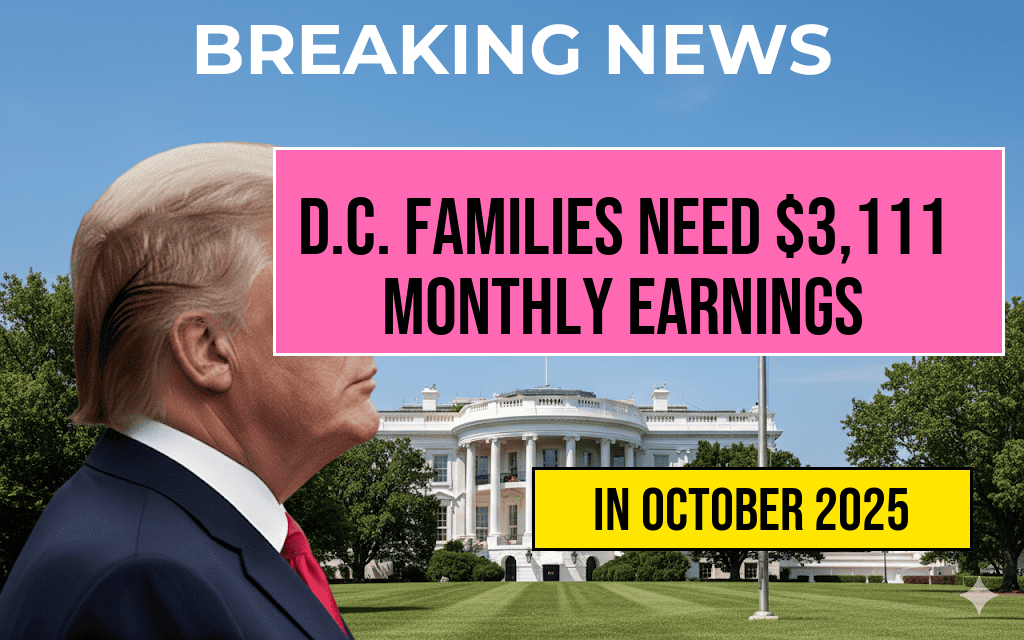The economic landscape in Washington, D.C., is presenting significant challenges for families relying on the minimum wage. With the minimum wage currently set at $17.95 per hour, a full-time worker’s monthly income before taxes stands at approximately $2,400. However, recent analysis reveals that the average cost of living for a family in D.C. is soaring to an estimated $3,111 per month. This discrepancy raises urgent questions about the viability of minimum wage earnings in one of the nation’s most expensive cities. Families are increasingly struggling to make ends meet, with housing, childcare, and healthcare costs contributing to the financial strain.
Cost Breakdown: Monthly Expenses for D.C. Families
To better understand the financial hurdles faced by households in Washington, D.C., it is essential to break down the average monthly expenses that contribute to the total cost of living.
| Expense Category | Average Monthly Cost |
|---|---|
| Housing (Rent) | $2,000 |
| Childcare | $800 |
| Utilities (Electric, Water, Internet) | $300 |
| Groceries | $300 |
| Transportation | $200 |
| Healthcare | $400 |
Housing Costs: The Largest Expense
Housing remains the most significant expense for families in D.C., with average rents soaring to around $2,000 per month for a two-bedroom apartment. This figure is considerably higher than the national average, making it difficult for families to secure affordable housing. The competitive rental market, compounded by a shortage of available units, continues to push prices upward.
Childcare and Healthcare Challenges
Another critical factor affecting family budgets is the cost of childcare. Many families spend upwards of $800 monthly on childcare services, a necessity for working parents. Coupled with healthcare expenses averaging $400 per month, families are often left with little disposable income after covering these essential costs.
Transportation and Daily Living Costs
Transportation costs can add another $200 to the monthly budget, especially for those relying on public transit or maintaining a vehicle. Daily living expenses, including groceries, contribute approximately $300 to the overall monthly cost. These necessary expenditures highlight the challenge of balancing a budget in a city where the cost of living consistently outpaces wage growth.
Minimum Wage Versus Living Wage
The current minimum wage of $17.95 per hour translates to about $2,400 monthly for a full-time worker, which falls significantly short of the estimated $3,111 needed for a family to maintain a modest standard of living. This gap raises important questions about the adequacy of the minimum wage and whether it reflects the realities of life in Washington, D.C.
Advocates for higher wages argue that the minimum wage should be adjusted to ensure that all workers can meet basic living expenses. Some studies suggest that a living wage for a family in D.C. should be closer to $29.00 per hour, which would better align with the region’s high costs.
Community Impact and Future Considerations
The financial strain on families is not just an individual concern; it affects the broader community. High living costs can lead to increased stress, reduced quality of life, and hindered access to education and healthcare. As discussions surrounding wage increases and housing policies continue, the voices of affected families are becoming increasingly critical in shaping future legislation.
As families in Washington, D.C., navigate these economic challenges, it is essential for policymakers to consider the implications of the current wage structure and the cost of living. Ensuring that workers can earn a living wage is vital for the well-being of families and the community at large.
For more detailed information about living costs and wages in D.C., visit Forbes or refer to Wikipedia for an overview of the local economy.
Frequently Asked Questions
What is the current minimum wage in D.C.?
The current minimum wage in D.C. is $17.95 per hour.
How much do D.C. families need to earn to cover basic monthly expenses?
D.C. families face a monthly cost of $3,111 for essential expenses when working full-time at the minimum wage.
What factors contribute to the high cost of living in D.C.?
The high cost of living in D.C. is influenced by factors such as housing, transportation, and childcare, which significantly impact the overall monthly expenses.
How does the minimum wage affect families in Washington D.C.?
Families earning the minimum wage often struggle to meet their basic needs due to the gap between their earnings and the high cost of living.
Are there any plans to increase the minimum wage in D.C.?
While there are ongoing discussions about potential wage increases, any changes to the minimum wage would depend on legislative actions and economic conditions.






